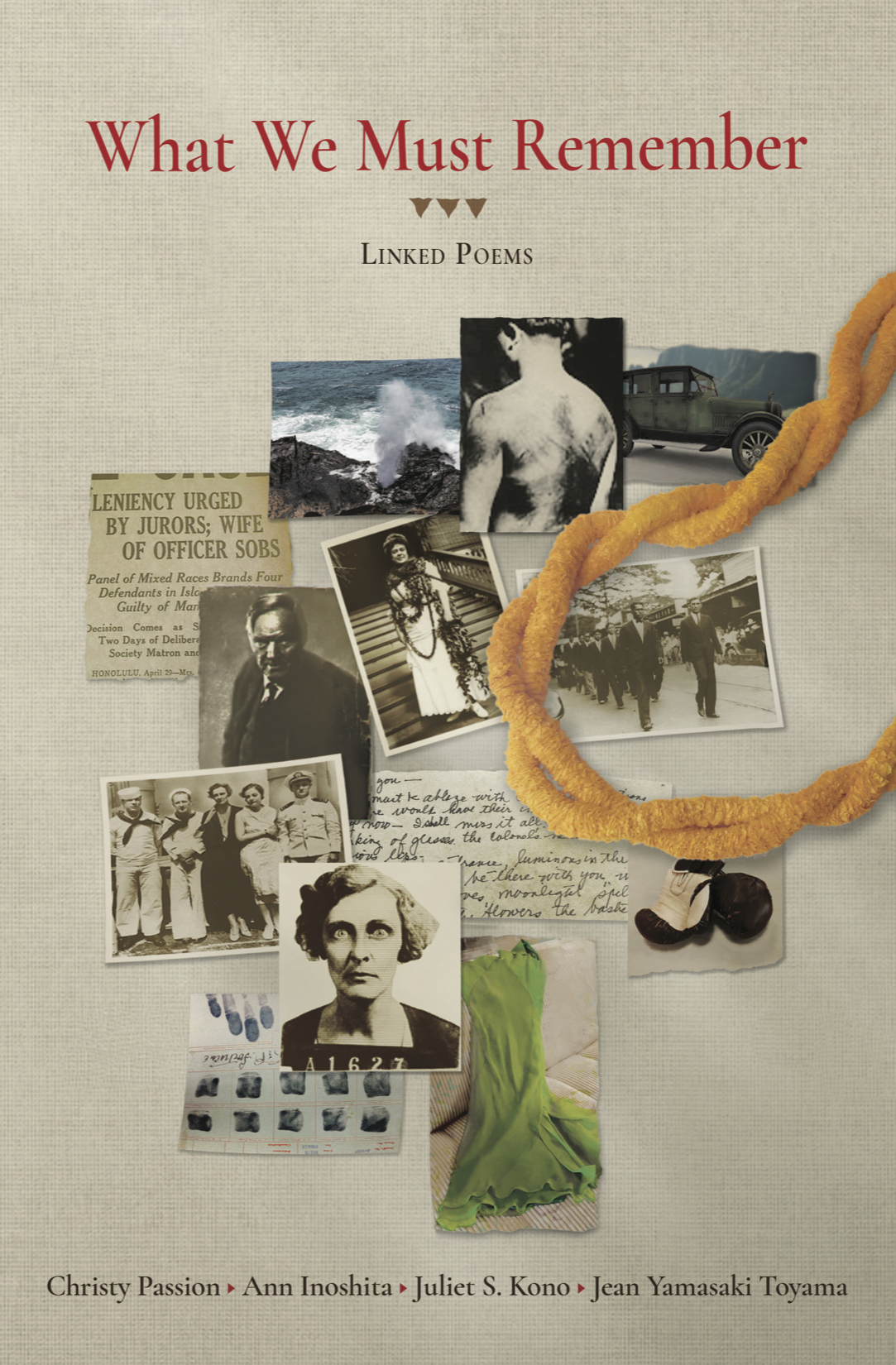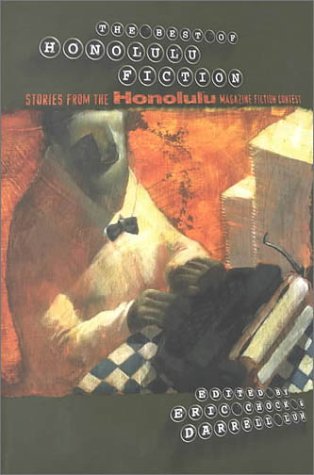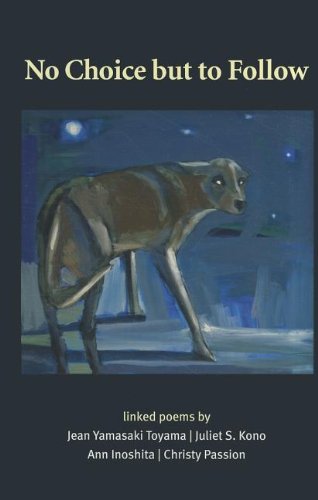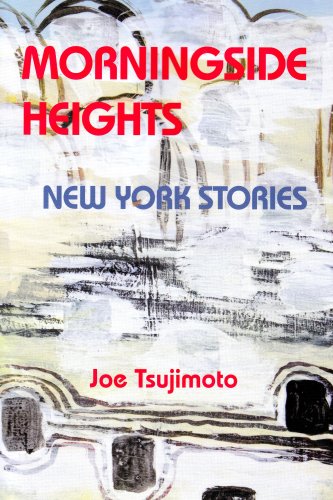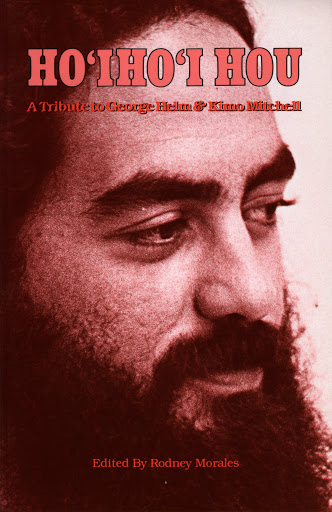What We Must Remember
by Ann Inoshita, Christy Passion, Jean Yamasaki Toyama, Juliet S. Kono
$18.00 Original price was: $18.00.$15.00Current price is: $15.00.
Winner of the Hawai‘i Book Publishers Association’s Ka Palapala Po‘okela Honorable Mention for Excellence in Literature
Linked poems by the award-winning authors of NO CHOICE BUT TO FOLLOW (BR #96), Christy Passion, Ann Inoshita, Juliet S. Kono, and Jean Yamasaki Toyama.
What We Must Remember features 28 linked poems, followed by insightful commentary on each poem by its author. With an introduction and timeline of events by Massie scholar John P. Rosa, this special issue revisits the 1932 kidnapping and murder of Native Hawaiian prize fighter Joseph Kahahawai and the events surrounding it, commonly known as “The Massie Case.”
Referred to as “one of the greatest criminal cases of modern times” by the Chicago Tribune, the incident was reflective of the racial tensions in plantation-era Hawaiʻi and, according to scholar David Stannard in his book Honor Killing, “provided the seedbed for subsequent [social] change” in the local community. In this new book, each poet investigates, interrogates, and brings to light the racial, ethical, and moral complexities of one of Hawaii's most controversial criminal cases, the linked verses interwoven with factual detail to create a mosaic of emotional depth that explores the implications of the historical events that took place and that continue to reverberate today.
| Authors | Ann Inoshita, Christy Passion, Jean Yamasaki Toyama, Juliet S. Kono |
|---|---|
| ISBN | 910043973 |
| ISBN-13 | 978-0910043977 |
| Year Published | |
| Number of Pages | 184 |
| Weight | 10.6 oz |
| Dimensions | 9 × 6 × 0.5 in |
Ann Inoshita was born and raised on O‘ahu. She has a book of poems, MANOA STREAM (Kahuaomanoa Press), and she co-authored NO CHOICE BUT TO FOLLOW, a book and CD of linked poems (Bamboo Ridge Press). Her short play, WEA I STAY: A PLAY IN HAWAI‘I, was included in THE STATEHOOD PROJECT performed by Kumu Kahua Theatre and published by Fat Ulu Productions. Her creative works have been anthologized widely in local and international journals. She teaches at Leeward Community College.
Juliet S. Kono is the author of several books: HILO RAINS, TSUNAMI YEARS, HO‘OLULU PARK AND THE PEPSODENT SMILE, THE BRAVEST OPIHI, NO CHOICE BUT TO FOLLOW, and ANSHUU, a novel. She has appeared in many anthologies and collections and is the recipient of several awards. She is retired and lives with her husband in Honolulu.
Christy Passion is a critical care nurse and poet. Her singular works have appeared in various local journals and anthologies, as well as in mainland and international journals such as CRAB CREEK REVIEW, HAIGHT ASHBURY LITERARY JOURNAL, BLUE COLLAR REVIEW, and MAURI OLA. She has received the James A. Vaughn Award for Poetry, the Atlanta Review International Merit Award, and the Academy of American Poetry Award. She co-authored NO CHOICE BUT TO FOLLOW and her début collection of poetry, STILL OUT OF PLACE, was published in 2016. She works and resides in Honolulu.
Jean Yamasaki Toyama is professor emerita of French and former Associate Dean of the College of Languages, Linguistics and Literature at the University of Hawai‘i at Manoa. Her latest books include a volume of poetry, PREPOSITIONS, and one of short stories, THE PIANO TUNER’S WIFE. She is a Beckett scholar.
History consultant:
John P. Rosa is Associate Professor of History at the University of Hawai‘i at Manoa. He is the author of LOCAL STORY: THE MASSIE-KAHAHAWAI CASE AND THE CULTURE OF HISTORY (University of Hawai‘i Press, 2014). He was raised in Kaimuki and Kane‘ohe on the island of O‘ahu.
Saturday night wasn’t busy in the Kapiʻolani building,
so no one from the Honolulu police could predict
an early morning phone call
that changed Hawaiʻi forever.
Before the call came, Agnes Peeples
walked into the building at 12:45 a.m.
Agnes said her husband was driving
when they encountered a car filled with men
where King and Liliha intersect.
Although the cars didn’t hit,
Agnes and a man from the other car fought,
resulting in blood seeping from her ear.
She remembered the car’s license number: 58-985,
and Officer Cecil Rickard recorded her statement.
The phone rings at 1:47 a.m.,
so Captain Hans Kashiwabara picks up.
Tommie Massie reports an assault
and wants the police to visit his house.
The captain calls Detective John Jardine.
Then Jardine contacts Rickard
who instructs police to drive to the Massie home.
Detective Harbottle, Detective Furtado, and Officer Simerson
listen as Thalia Massie speaks:
She was at the Ala Wai Inn
and went for a walk at about midnight
when a car with four or five Hawaiians came by.
She was forced into the car and punched.
They drove her to a secluded area,
removed her from the car to the bushes,
and raped her six or seven times.
—Ann Inoshita
A bonus: The individual commentaries at the end are more than grace notes. They restart the story, as each poet discusses the challenges and doubts she faced. They didn’t start as experts, and their immersion in research is a journey much like the one we take, diving with them into the past. The project makes witnesses of us all.
—HONOLULU Magazine
June 2017
The 1931 Massie-Kahahawai case, involving a false accusation of rape followed by the killing of an accused assailant, laid bare the race-based fractures in Hawaiʻi society. In What We Must Remember, a group of poets “talk story,” speaking in the voices of the varied participants in the events. In the verse documentary tradition of Stephen Vincent Benét’s epic “John Brown’s Body” and Anna Deavere Smith’s plays, this book is a stirring work that uses art to unlock the story of a searing event in American history.
—Greg Robinson
Département d’Histoire Université du Québec À Montréal
There are many accounts of the infamous Massie Case, rendered in pamphlets, essays, documentary film, a TV miniseries, a play, an opera, and books by novelists, journalists, and historians. Almost all these works were produced by haole, most by people who never lived in Hawaiʻi. Of necessity, they were on the outside looking in. Missing was a pathway to the inside. What We Must Remember is a meditation and exchange among four local poets, exploring through “documentary renshi” the imagined consciousness of victimizers and victims, observers and observed. It is a fresh and emotionally engaging piece of work.
—David E. Stannard
Author of Honor Killing: How the Infamous “Massie Affair” Transformed Hawaiʻi
What We Must Remember is above all a highly nuanced renshi that blends the work of four accomplished poets into a moving response to one of the most notorious and culturally significant moments in Hawaii’s history. But this collection is also a valuable archive, providing readers with historical background and references for further study and including fascinating and informative essays by the poets themselves about the process of collaborative composition for the entire renshi, as well as for each of their individual links. Many have told us about the Massie- Kahahawai cases; What We Must Remember guides us in how to feel about them.
—Craig Howes Director, Center for Biographical Research University of Hawaiʻi at Manoa
The four skilled renshi poets and authors of What We Must Remember revisit and revision one of the most disturbing episodes in Territorial Hawaiʻi. The Massie-Kahahawai case was disruptive on many levels—legal, social, personal, local, and national. The details were documented in the day through layers of news, story, and memory and the well-informed poets make the historical fresh again through their lyrics and narratives. The poetry is compelling and experiential; events are viewed through multiple, overlapping perspectives, the spin and eddy of each section being like shards of a broken mirror. The essays illuminate both the events and the processes of bringing them into new form. It is a powerful way to reflect.
—Puakea Nogelmeier
Professor of Hawaiian Language University of Hawaiʻi at Manoa
Important, unique, and timely, this book of poems, with illuminating commentary on the process of its making, asks of history: what must we remember? In this sensitive reconstruction of racist crime and official injustice, giving voice to those involved, four poets choose to link their poems, creating unexpected discoveries as they imaginatively enter together one of the uglier chapters of Hawaii’s history. A moving exploration of the human cost of privileged prejudice, and how collaborative creative process can reveal it.
—Eleanor Wilner
Author of The Girl With Bees in Her Hair


